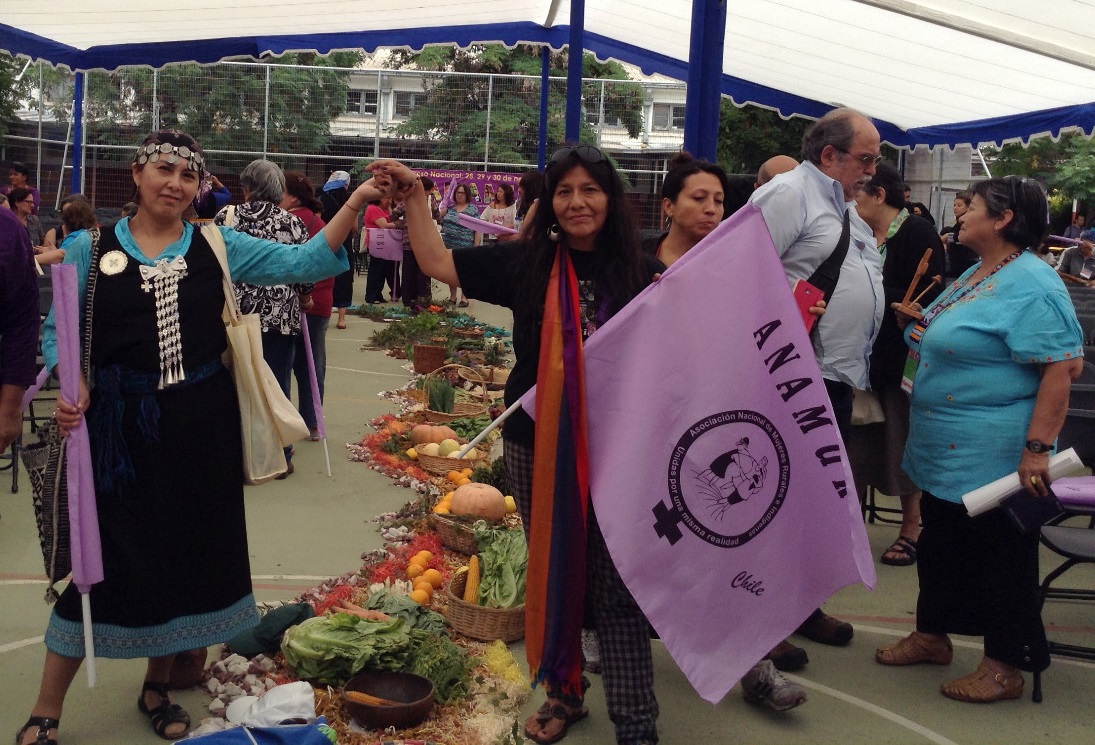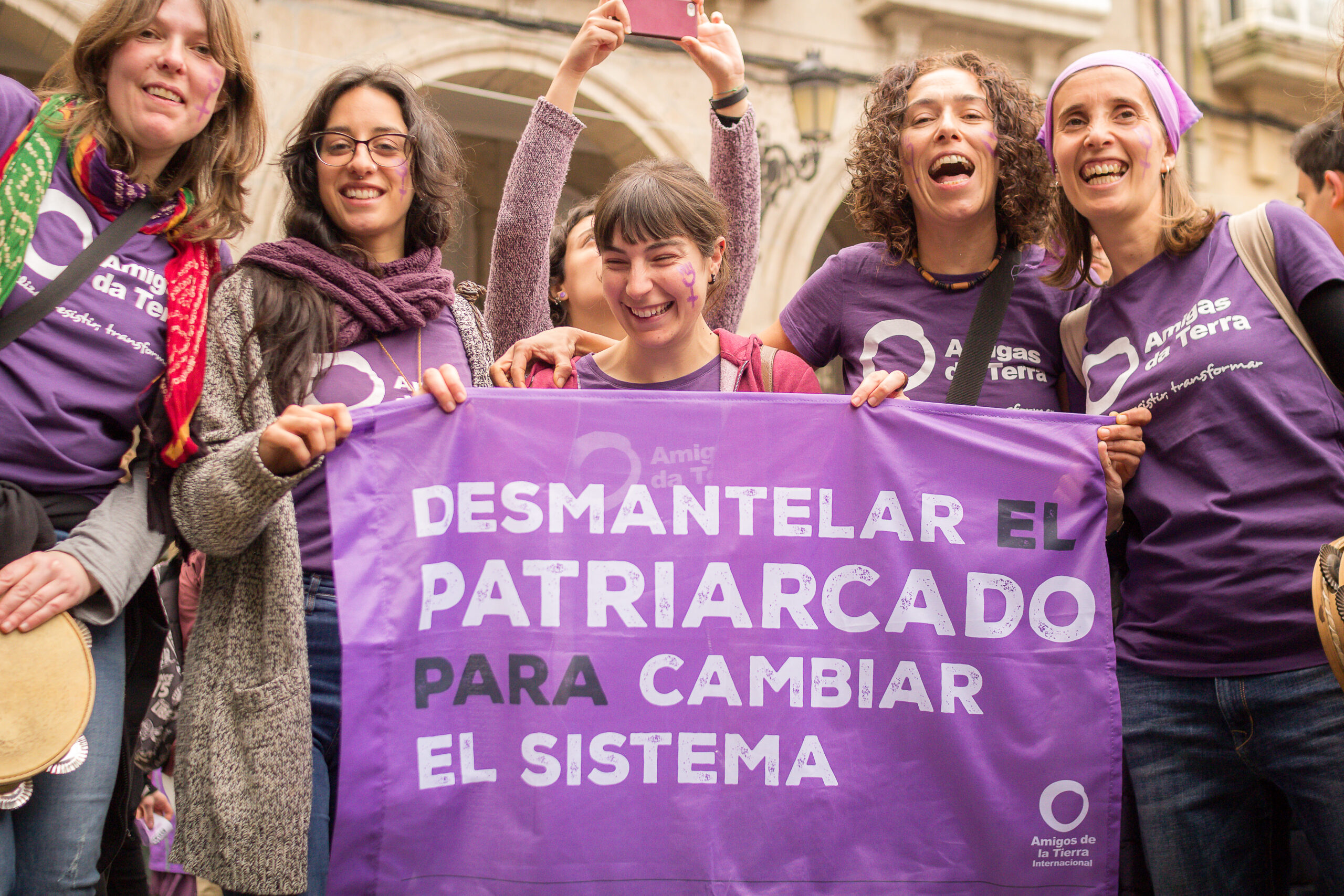Historic elections in Chile towards a new plurinational Constitution
Analysis of the Chilean electoral day with conventional elect Alejandra Flores and ANAMURI representative “Pancha” Rodríguez
 Millarray Painemal, elected alternate (left) and Alejandra Flores, elected constituent (right), members of ANAMURI.
Millarray Painemal, elected alternate (left) and Alejandra Flores, elected constituent (right), members of ANAMURI.
Over the weekend, fruit of the popular struggle, the Chilean people elected their Constitutional Convention to draft a new Constitution to put an end to the one that has been in force since the Pinochet dictatorship. The event was divided into two days to comply with health protocols, and the results were historic. Simultaneously, regional governors, mayors and councilors were voted.
In a country where elections are not mandatory, between May 15th and 16th, a total of 6,458,760 voters went to the polls, representing 43.35% of the electoral roll, according to the latest report from the Chilean Electoral Service. This is a lower number than the plebiscite of October 25, 2020 when the call for these elections of constituent candidates was approved, but higher than the previous municipal elections.
The Constitutional Convention was made up of 155 people. The ruling party, represented in the ‘Vamos por Chile’ party, obtained 23.9% (37 of the 155 seats); it did not reach a third of the total, so they will not have the possibility of a veto. The right wing also lost the governorship of the Metropolitan region and the municipality of Santiago de Chile.
The list ‘Apruebo’, made up of the center-left with several members of the former ‘Concertación’, won 25 seats. The list ‘Apruebo Dignidad’, which brings together left-wing parties, including the Communist Party and ‘Frente Amplio’, won 28 seats.
The independent candidates obtained 65 seats, among which are the 17 for indigenous peoples, whose presence will have a great impact within the Convention. Among the original peoples, the Mapuche took 7 seats and the Aymara 2. The low vote for political parties shows that this path continues as it began: rejecting the economic and political elites.
The elections and the formation of the Constituent Assembly were carried out under gender parity mechanisms; in this regard, the result was 78 men and 77 women. Several women had to give up their positions to avoid “overrepresentation”; without these resignations, women would have occupied 84 places, and men 71.
Francisca “Pancha” Rodríguez, representative of the National Association of Rural and Indigenous Women (ANAMURI) of La Vía Campesina, analyzed these voting days, the process and the results for Real World Radio.
Regarding the perceptions left by the vote, Rodríguez said: “Today we have woken up with that feeling we had 50 years ago when the popular government triumphed, because today it was a triumph of the people. And, at the same time, with some anguish, due to the sanitary barriers, the lack of transportation and locomotion for the people, due to the absence of a larger vote and this social isolation”.
Regarding the unprecedented results, the ANAMURI representative considered “the concrete fact is that the great winners, the victorious ones, the undoubtedly most voted, were women; on the other hand, there was a very significant vote of the independents.” At the same time, she called to sharpen the eye on the independent candidacies: “Most of them are people who are to the left or next to the people, but there is also another sector; since today they were all independent, overnight the symbols that identified the parties or alliances disappeared, no one wanted to say where they were from, many people with very old militancy or leaderships were located in the independent quotas of the parties.”
A shared analysis of these elections indicates that the great losers are the right-wing parties and that there was not a full participation of the youth compared to the previous plebiscite. On this last point, Rodríguez reflected “we want to be with them in the streets, but also to build together the paths of this new Constitution. That is pending work still.”
Francisca “Pancha” Rodríguez made a projection of the processes of the Constituent Convention and an analysis of the regional and municipal elections.
The process is partly an uncertainty. Everything is new, everything is yet to be built, “it will undoubtedly be a Constitution that will have ups and downs, so we think that the plebiscite should be a tool to be applied in the development of the constitution itself in order to resolve the issues that arise.” Regarding the right-wing minority in the Constituent, Rodríguez reflected: “Now it is the people who have to agree. Today it’s in our hands, we have power and we must know how to exercise, apply and build power; it’s a job that is going to go hand in hand with the construction of the constitution”.
“We really hope that it would be a tool that contributes to the elaboration of this Constitution, but above the peasant demand, we work on a proposal from rural women, which is broader, since we’re looking not only at the defense of peasant agriculture, but the defense of life, the unity of the people, the extent and recognition of sexual diversity,” assured Rodríguez in relation to the peasant proposal that ANAMURI presented with other organizations.
Regarding the municipal candidacies, Rodríguez lamented the lack of strength of the independent candidacies that focused on the Constituent and left these spaces to the parties. She also highlighted some historical victories such as that of Irací Hassler, representative of the Communist Party, for the municipality of Santiago. She also said about the defeat of the right wing in other key municipalities such as Maipú and Viña del Mar: “Our country has indeed awoken, conscience is being rebuilt and the force is being reconstituted.”
Making history: a woman, ecofeminist, Aymara and human rights activist elected to draft the new Constitution
ANAMURI brought eight candidates for the Constitutional Convention, and two of them were elected: Ivanna Olivares Miranda for the Coquimbo region and Alejandra Flores Carlos for the Tarapacá region. Real World Radio spoke with Alejandra Flores Carlos, the only woman in her region who obtained a seat. Her nomination was not for a seat of indigenous peoples, so she is an addition to the 17 guaranteed places and expands the indigenous representation.
“This election allows us to bring citizen demands to this constituent process, without the intervention of political parties.” Flores agrees with Rodríguez’s analysis of the lack of trust in political parties: “The public set out to support independent people, it was a punishment towards the traditional political parties.” For this reason, the elected candidate emphasizes the importance of the participation of the people, not only in the approval of the constitutional text but also in the drafting process.
Women and indigenous peoples got their participation in the Constituent fighting in the streets; now is the time to materialize their demands. Flores will be one of its representatives: “I am here for an anti-patriarchal State where a significant equality between men and women is guaranteed. As indigenous peoples, we want this Constitution to be plurinational and intercultural, recognizing and protecting the rights of indigenous peoples.”
Flores understands that the new Constitution should ensure more rights and guarantees for the people. She also explained the next steps for the construction of this new Constitution. “One of the pillars must be human rights, the fundamental rights of the people; we propose a social and democratic rule of law, to end this subsidiary State that only benefited large companies.”
The next step in this process is to establish the Convention as such, outline its operation, choose who will preside over it, and draw up regulations. “There is a lot of work to be done; a great challenge and a great responsibility,” Flores said.
The new Constituent Assembly will have nine months to present a new constitutional text, which may be extended for three months in a single opportunity. Once the new constitutional text has been drafted, the Chilean people will vote for its approval or rejection by plebiscite. These elections are estimated to be in mid-2022.
Flores remembered and thanked all the people who fell into these social struggles, “the nearly 600 people who are victims of eye trauma, those who went blind, and all the people who also lost their lives, young people who are imprisoned, young people who started the revolt; they made it possible for people like me to sit in these spaces to represent citizens”.






